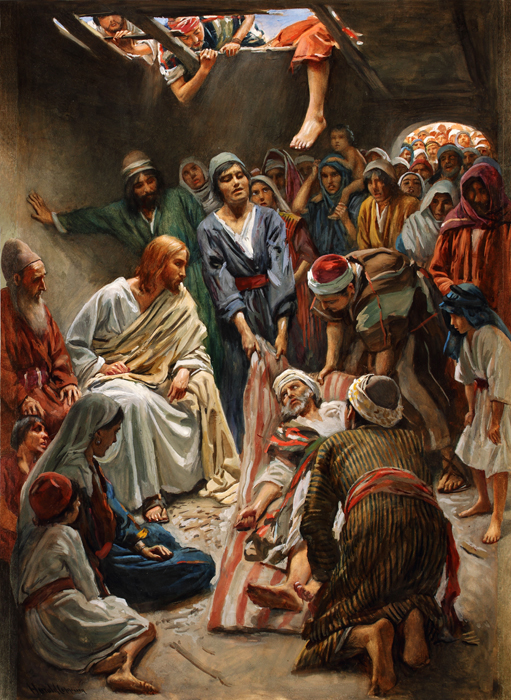Yeah you probably never heard of this sacrament, if you have even heard of a sacrament at all. We evangelicals have very little use or understanding of such things. The dictionary says that a sacrament is an outward sign of a spiritual reality. I think that is a fair definition. In one sense everything is sacramental. This world and everything in it are the incarnated words of Almighty God. He didn’t just create something, he created a world with meaning directly related to his character. Christ almost always taught by parables or by metaphors from nature. This was easy because he created the world to do so. Not only are we in this world but we are in a world designed to speak to us. Psalm 19:2 says “The heavens declare the glory of God // and the sky above proclaims his handiwork. // Day to day pours out speech //and night to night reveals knowledge.
Greek philosophy under Plato attempted to separate the world into the seen and unseen, physical and metaphysical. The seen was just a shadow of the actual unseen world. The seen was on a lower plane, below the unseen. Matter was evil, this was the Gnostic heresy of the first century, and the idea persists today. But that is not the Christian belief, though it seems like it sometimes. Matter was created by God and he said it was good repeatedly in Genesis 1. Matter will persist, Christ received a new body and there will be a new earth. And it’s not necessarily bad to divide the world up in this way. We understand that there are seen and unseen aspects to this world. The problem comes when we discount one or the other.
I think our pastor did just this in his exposition of Mark 2, this week. In always searching for a spiritual message he minimizes the physical reality of the story. How interesting is a story where someone comes to Jesus and Jesus tells him his sins are forgiven? Not very, I would say. Theoretical discussions with no physical reality are bo-oring. But God gives us a story where there is an outward sign that sins were forgiven. And we love it, because we are sacramental creatures who live on the incarnate word of God known as planet earth. It’s a good story. It’s the same reason God gave his people the physical acts of following the Mosaic Law. It’s the same reason Jesus gave us the sacraments of Baptism and the Lord’s Supper. It’s how we are made.
Baptism isn’t just a sign of what is going on inside, we are actually cleaned on the outside. The bread and wine are not just symbols of Christ’s body and blood, they actually nourish us. Jesus didn’t just tell people their sins were forgiven he showed them by acting it out on their bodies. And God is praised. Who cares if no one got saved on the scene? There is no proof that is true, but who cares? God’s creation was restored and God was glorified. That’s more good than I see on a given day. We need to get away from this all-or-nothing Christianity, it’s really just that dualism I mentioned earlier. Things can happen on this earth without someone getting saved and they can still be good. Christ went out of his way to curse a fruitless tree Mark 11:12-14. Isn’t that a waste of time since all that really matters is the spiritual level? He could have been getting someone saved, instead he is off talking to trees. But the point is that creation was not doing it’s job so Christ rebuked it. Take the reverse, when creation is doing it’s job it is a good. God was glorified when this story happened and he has been glorified every time it was told, because it was a good story. The heroes and villains were all in the right place, there was conflict and the meaning is clear.
It might be hard to hear but the most important thing is that God is glorified. It’s not that any one person is forgiven or that he receives real salvation. It’s not that all the good people are safe and the bad people are locked up in cozy ACLU approved prisons. Sometimes the good guy gets killed, sometimes Jack Bauer shoots his partner. It makes a good story. Romans 9 tells us that God appoints all the characters in the story, heroes and villains. He appointed Pharaoh to make a good story, to make God look good. In Mark’s story, Christ the king is walking on the earth and conquering everything in his path.
I also had some other questions about the narrative presented. How do we know that this man was only interested in being healed? How do we know he cared about that at all? Maybe he just wanted to hear Jesus’ teaching and he couldn’t get in because some leper went around blabbing and now the religious leader got all the good seats next to the superstar. While we are making stuff up, why don’t we invent a whole story for this guy? Ok. He was a pimp and he ran a large brothel. It was three doors down from the synagogue, surprisingly the Catholics have not built a church over this house, but that’s how it goes. Coincidentally it was frequented by many of the religious leaders, when they weren’t dragging adulterous women into the temple. So, anyways, he was pimping along and everything was going great and then one day he ate some bad mutton and woke up paralyzed. All he could do was drool and all his harlots were being taken away. It was horrible. So, four compassionate gay Samaritans from a neighboring homosexual brothel carried him to see Jesus. That’s four doors down from the synagogue, in case you were wondering. Once they got him healed he was a superstar and he went back to pimping and business was better than ever. No one was saved, Jesus loves sinners, the end. Sure great story but it’s not the one Mark wrote. Now, I don’t have a problem with making up stories, the more the better. But do it the right way, don’t read your story into the scriptures, because you need sermon material. Every sermon should be a new story, a retelling of the gospel in light of the people you are speaking to. But there is no need to confuse the two.

Jesus Heals the Paralytic, Stained Glass, St. Vincent de Paul Chapel, St. Louis, MO, photo by Jeff Geerling


